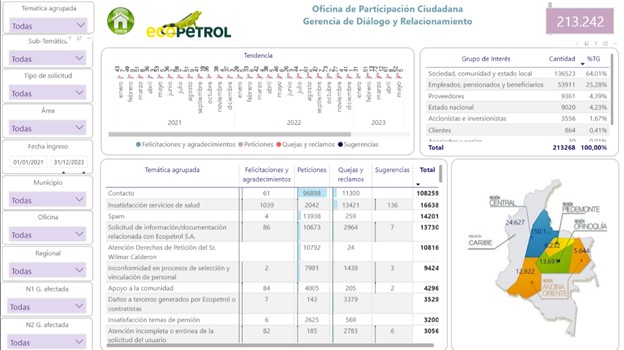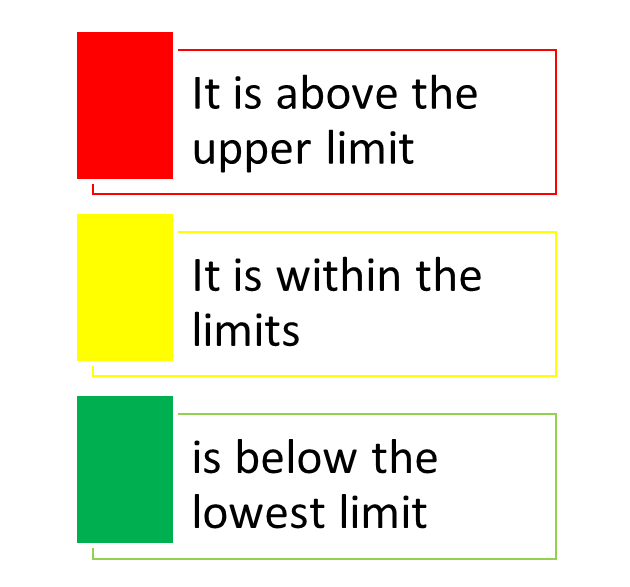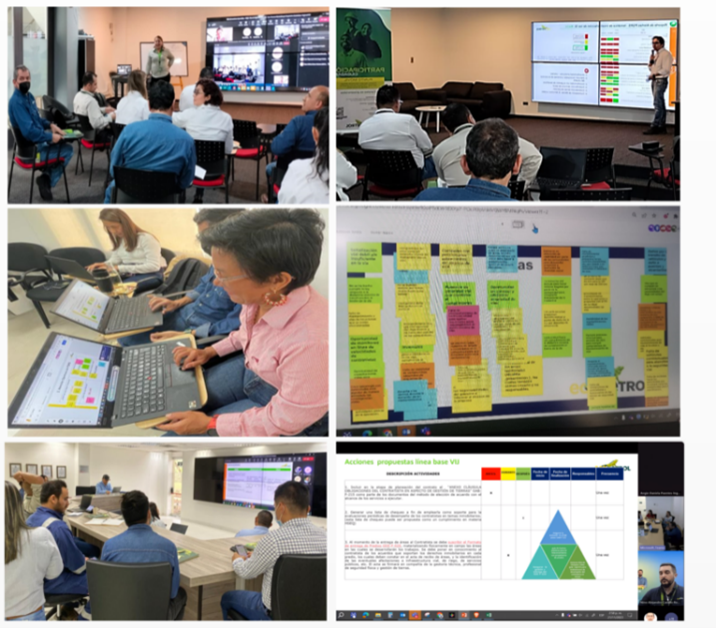 PautaInternas
PautaInternas
 Stakeholders management
Stakeholders management
Stakeholders management
May 16, 2024
Monitoring of management with the stakeholders
The Citizen Participation Office - OPC (for its acronym in Spanish), committed to the pursuit of excellence and continuous improvement, monitors the relationship with its stakeholders to identify opportunities for improvement in the processes, relying, as a source of information, on the Petitions, Complaints, Claims and Suggestions - PQRS (for its acronym in Spanish) received in the company.
Different types of reports are issued pursuant to these guidelines. The most representative ones are:
|
# |
Type of report |
Level |
Frequency |
|
1 |
TOP themes monitoring |
National |
Monthly |
|
2 |
Alarms in the setting |
National |
Weekly |
|
3 |
Analysis of PQR trends (KRI) |
National |
Quarterly |
|
4 |
PQR monitoring by regional |
Regional |
Bimonthly |
|
5 |
PQR monitoring by process |
National |
Monthly |
|
6 |
Monitoring by stakeholder |
National |
Quarterly |
|
7 |
PQR analysis by segment or project |
Regional |
As per instrument |
|
8 |
Socioenvironmental compliance of the EMPs of all assets and projects |
National and Regional |
Monthly |
|
9 |
PQR for evaluation of contracts |
Regional |
Monthly |
|
10 |
PQRS for Audits |
Regional |
By demand |
|
11 |
PQRS for disciplinary and ethical investigations |
National |
By demand |
These reports make it possible to identify setting alarms, process deviations, expectations, and disagreements among stakeholders, and, in general, situations that may affect the relationships in the territory.
All the data are taken from the PQRS management tool (Salesforce), and its processing and analysis is done through Excel and PowerBI. Data visualization is done in PowerPoint presentations, ArcGIS, and PowerBI dashboards in real time. An example is included here in below:

To ensure that this information includes the necessary details to manage improvement in processes or relationship situations, there are 1,292 sub-themes, grouped into 208 themes.
It is worth to note that since 2015, the Analysis of PQR Trends has been conducted with the aim of warning the organization about behaviors in areas implying risks, seeking that such dissatisfaction tends to be zero, by identifying their root cause, and establishing improvement or mitigation plans.
These measurements are based on the control limits methodology, according to which the monthly complaint report for the previous two years is established for each subject grouping, distortions are eliminated, and an average line is obtained, plus some deviation percentages that determine the lower and upper limits. This makes it possible to compare the complaints of the period measured with the historical of the same group. The aforementioned alerts are reported as per the following guide:

By monitoring 18 grouped themes, the behavior of 80% of all the complaints received at Ecopetrol is analyzed. This makes it possible to identify whether dissatisfaction in certain topics is growing or decreasing, as a starting point for analyzing the causes of the deviation.
The whole monitoring exercise has made it possible to detect opportunities for improvement in the processes, products, or services of the organization, which are reflected in the action plans defined and executed by the areas in charge of relationships, seeking to resolve the causes that give rise to the problems identified. In 2023, 12 improvement plans were defined, with 290 actions, which impact the most relevant issues related to the stakeholders, i.e. Society, Community, and Government; Customers and Suppliers, and their Contractors all over the country.

All of the described process is governed by the procedure for monitoring and improving the management of stakeholders.
Accountability
Ecopetrol is one of the leading companies in Colombia in the practice of the constitutional exercise of accountability with its stakeholders, as, in addition to the traditional mechanisms established by law, it has a large number of channels, specialized events and written reports that reaffirm its commitment to information transparency.
Any citizen seeking to communicate with the company from anywhere in the world, or request information about its management, can do so fluidly and permanently using the mechanisms established for securing transparency and access to information. These include:
- Shareholder's Meeting. This meeting is held annually, whereby the results are reported in detail to the shareholders and the decisions of that corporate body are made.
- Participation scenarios. Events focused on specific themes and places, with a methodology based on the portfolio of the Citizen Participation Office – OPC (for its acronym in Spanish).
- Web page information. It contains updated information about the company operations and results, as well as relevant information for each Stakeholder.
- Integrated Management Report. This annual publication includes general information on the company, its value chain and operational processes, financial results, stock behavior, risk management and, at large, economic, social, and environmental aspects.
- Attention of information requests. All citizens may have access to company information as per specific requirements, which are addressed within the terms set forth by the law that regulated the right of petition.
Environmental claims
In 2023, 484 claims were addressed (including cases classified as complaints and claims) about alleged environmental impacts caused by Ecopetrol or its contractors in performance of their industrial and commercial activities, details of which can be consulted through the Citizen Participation Office – OPC (for its acronym in Spanish).
Table. 2023 Environmental claims
|
Topic |
Number of cases |
|
Crops and vegetation |
139 |
|
Affectation on water bodies |
122 |
|
Handling of chemical substances and residues |
69 |
|
Damage on properties |
48 |
|
Noise |
46 |
|
Smell |
38 |
|
Atmospheric emissions |
22 |
|
Total |
484 |
Source: Citizen Participation Office
Regarding the validity of these claims, 34% of valid cases are reported, that is, they corresponded to events for which the Company had to implement mitigation actions:
Table. Validity of Environmental claims 2023
|
Validity of the claim |
Number of cases |
|
Not valid |
237 |
|
Valid |
163 |
|
Transferred |
42 |
|
Ongoing |
42 |
|
Total |
484 |
Source: Citizen Participation Office
Labor practices and discrimination complaints
As of 2023, 27 claims were filed regarding “labor practices” for alleged harassment and working conditions; there are no “discrimination” cases registered from Ecopetrol employees.
Furthermore, 69 claims were received from contractor employees, which were transferred by Ecopetrol to each of the respective companies, as they are responsible for guaranteeing adequate working conditions for their workers; these claims are related to "labor practices" associated with working conditions and workplace harassment.